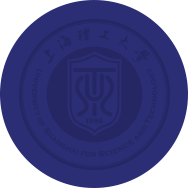“What I value most is the students’ reaction to my class when they really enjoy it. And at the end of the semester, they indeed learn something from me,” said Dr. Adrian Hartridge during the interview on April 1st.

Dr. Adrian Hartridge, an admired teacher amongst colleagues and students, has been teaching English at USST for seven years since 2012. Having received his bachelor’s degree in Bristol and doctor’s degree in Warwick universitiy, Dr. Hartridge worked for 20 years as a material scientist conducting lots of research. He started to be a teacher in 2009, then obtained the teacher’s certificate in 2011 and begun his story with USST in 2012. Now he has become an experienced and qualified English teacher at USST which has brought him many memories.
His class is full of fun and wisdom. Here is how he infuses the wisdom into teaching. Divided into different groups each class, students in Dr. Hartridge’s class benefit from learning with different classmates each week, performing tasks not on their own but with help. This way, they are often highly motivated and active in learning English. From his point of view, the major goal of organizing an oral English class is to lead the students to open their mouth and participate in the class activities. Therefore, Dr. Hartridge has created many distinctive and entertaining activities to involve students in the class to intensively communicate with each other. “Paper Race”, one of the games introduced by Dr. Hartridge, requires students to work in groups to write down the correct answer and then one runner tries to get the answer as quickly as possible to the teacher. Another activity called “Onion Ring” effectively prompts students to talk to each other. Students in two lines discuss a topic face to face with each other, and are required to move to the next person after the discussion. Unlike the traditional Chinese class, those diverse activities developed by Dr. Hartridge create a competitive and pleasant learning atmosphere among students where they learn with entertainment and happiness.

When asked about English-learning advice for Chinese students, he recommended English learners travel abroad when it is possible. “It’s essential to see how other countries are for everybody. It’s just how other cultures are, what other people look like, how they act, how they eat and what they talk about.” Dr. Hartridge believes travelling abroad may increase students’ enthusiasm for language learning and help them to broaden their view and know the world.
As for the changes taking place in Shanghai and USST, “I was shocked by the local residents who kept staring at me for there were few foreigners in the neighborhood 12 years ago when I first came to Shanghai,” Dr. Hartridge told us with a smile. From what he recalled, there were only 4 metro lines, which was quite inconvenient. He had to walk about 2 kilometers to the metro station, but now there is one just down the road. He has got used to and enjoys his life in metropolitan Shanghai because of the complete infrastructure, convenient transportation system and colorful life. As for the USST campus where he has been working for 7 years, he has also witnessed many changes. More modern and high-standard teaching buildings have been built. Modern facilities like computers and air conditioners have been provided. The university is getting better and better. The students also have changed a lot in his view. He spoke highly of the students at USST and described them as “bright, intelligent and highly motivated”.
When talking about his future career plan, “I would continue to teach at USST because I like it. I have a sense of belonging to USST with the green and beautiful campus where there are hardworking students, nice colleagues and comfortable life.” he said to us. And after retirement, he plans to travel more and spend more time with his family back in England. Luckily, before his retirement, we can still for a while see this responsible and creative teacher who devotes himself to teaching English through diverse lively and creative activities.

 Home
·
News & Events
·
Content
Home
·
News & Events
·
Content

